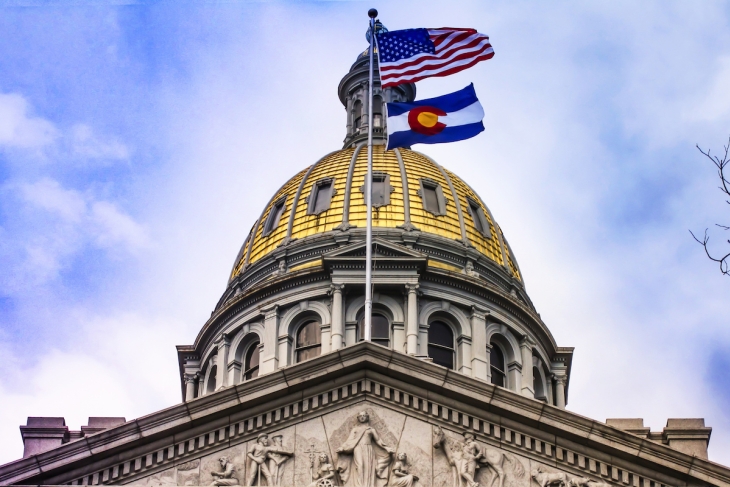As the clock winds down towards Election Day, Colorado voters—myself included—face an important decision beyond the presidential contest: whether to amend the state constitution to enshrine a “right to school choice.” To be clear, the Centennial State has a long and proud record on the issue. Fifteen percent of all Colorado public school students—my nine-year-old daughter among them—attend charter schools. More than a quarter participate in open enrollment within or across traditional district boundaries. Yet the state lacks a private school choice program (though it once had a short-lived district-level voucher program). This is where proponents and opponents of Amendment 80, the “Constitutional Right to School Choice Initiative,” part ways on the implications of this measure, should it come to fruition.
Simply worded and seemingly innocuous, the ballot measure comes in at around one-hundred words:
Be it Enacted by the People of the State of Colorado:
SECTION 1. In the constitution of the state of Colorado, add section, 18 to article IX as follows:
Section 18. Education - School Choice (1) Purpose and Findings. The people of the state of Colorado hereby find and declare that all children have the right to equal opportunity to access a quality education; that parents have the right to direct the education of their children; and that school choice includes neighborhood, charter, private, and home schools, open enrollment options, and future innovations in education.
(2) Each K–12 child has the right to school choice.
Sponsored by a conservative non-profit group, it requires 55 percent of the vote to pass. Whether it reaches that threshold remains to be seen, but similar school choice initiatives in Colorado have failed in the past, even when the state leaned Republican.
Supporters of the measure, which include the Colorado Association of Private Schools and the Colorado Catholic Conference, are pushing for its passage as a hedge against the teachers unions and their backers, who have vehemently opposed all alternatives to the traditional system. While the amendment likely wouldn’t affect Colorado’s “Blaine Clause”—a provision that prohibits the use of public funds to support religious schools—now arguably a dead letter in the wake of recent U.S. Supreme Court decisions, proponents say that a constitutional right to school choice would serve as a last line of defense. This would be crucial should the legislature (or a local school board) do something completely out of bounds. From imposing burdensome regulations upon private schools to cracking down on homeschooling, advocates are trying to cover all their bases. Additionally, it could provide greater protections for charter schools, which have been increasingly under threat in recent years. For instance, it could empower parents to challenge denials of charter applications by local school districts.
The opposition spans a laundry list of characters from the teachers unions to libertarians wary of government interference. The former label the measure a “wolf in sheep’s clothing,” claiming that it paves the way for public funding of private schools, while the latter argue that the proposal undermines parental rights and opens the door to government overreach. One local columnist made no bones about his skepticism:
When [the measure] likely fails, the enemies of educational choice will cry, “The people have spoken, and they don't want school choice. It's a mandate.” And it has been tough enough to keep charter schools safe from this choice-hating legislature.
[The measure] does not create a new school choice program (or even framework for a program) of any kind. It only creates a new avenue for lawsuits that may or may not lead to some sort of jurisprudence many years in the future.
Should it pass, [the measure] would put a “right to school choice,” including “private” schools, in the Colorado Constitution, but doesn’t define what “private schools” means. The legislature and the courts will have to interpret it, and that could lead to regulating private schools.
Alarmed by the prospect of government encroachment, homeschoolers, in particular, are vocally in opposition to the measure.
Colorado’s main charter school organization is attempting to stay above the fray. (Full disclosure: I serve on its board of directors.) So is the state’s pro-charter governor—a Democrat. While there’s a lot to like about codifying a child’s right to school choice, the proposed amendment places charter schools in a politically tricky position. Republicans are currently the only party willing to support them, and charters have become verboten among Democrats (save for the state’s Democratic governor!). Making matters worse, the amendment could create confusion about the judiciary’s role. As one local professor quipped, “[The measure] really is a ‘full employment for lawyers’ act. It puts judges in the driver’s seat later on to try to make some sense out of this.”
With fourteen statewide measures on the ballot, proponents have their work cut out for them. What they might perceive as straightforward, critics view as ambiguous. With a presumption of good intentions from the measure’s sponsors, history and experience suggest that more preparation and groundwork were needed to rally and unify Colorado’s disparate school choice stakeholders around any referendum. Should this one go down in defeat, it may be because this latest iteration of school choice advocacy became more about political theater than substantive policy.




